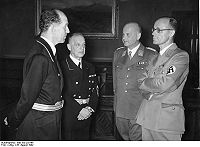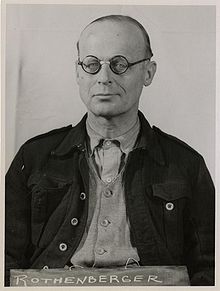- Curt Rothenberger
-
Curt Ferdinand Rothenberger (born 30 June 1896 in Cuxhaven - died 1 September 1959 in Hamburg) was a German jurist and leading figure in the Nazi Party.
Contents
Hamburg
In the immediate aftermath of the Nazi seizure of power Rothenberger was part of an unofficial group within the Nazi Party, led by Hans Frank and Roland Freisler, the aim of which was to transform the legal profession by installing loyal party men in leading positions within the judiciary.[1] Rothenberger was appointed Senator of Justice in Hamburg and set about putting these ideas into practice, insisting that all judges had to be "100% national socialist" and had to be trusted by party officials. Where this was not the case the judges faced summary dismissal.[2] Jewish judges were removed from office as early March 1933 under Rothenberger's orders.[3]
Nonetheless as senior judge in the Hanseatic Higher Regional Court Rothenberger clashed with the Gestapo in 1938 over their practice of rearresting people who had been released from prison. When Rothenberger took the case of two Jehovah's Witnesses who had been arrested immediately following their release after spending eight month in prison for their religious activities it was agreed that the Gestapo would end this pracitce except in cases where those released were continuing to offend.[4]
Justice Ministry
 The four Nazi legal reformers together. Left to right Roland Freisler, Franz Schlegelberger, Otto Thierack and Curt Rothenberger
The four Nazi legal reformers together. Left to right Roland Freisler, Franz Schlegelberger, Otto Thierack and Curt Rothenberger
Rothenberger sent his ideas about judicial reform to prominent legal expert Hans Lammers in early 1941 although he was not impressed and rejected the plan. Rothenberger then sent the same ideas to Rudolf Hess who was much keener but made his ill-fated flight to Scotland before he could act on them. Finally in 1942 Rothenberger condensed his ideas into a short memorandum and, through Martin Bormann, had this version shown directly to Adolf Hitler. In reaction Hitler made a speech to the Reichstag on 26 April 1942 in which he sought and received full power to undertake a root and branch reform of the judiciary based on the Rothenberger principles.[5]
In order to undertake these changes Justice Minister Franz Schlegelberger was dismissed and replaced by Otto Thierack with Rothenberger appointed his state secretary in charge of judicial reform, albeit was Bormann's ally Hans Klemm added as an another state secretary in order to limit the power of Rothenberger.[6]
One of his first acts as state secretary was to agree a deal with SS-Brigadeführer Bruno Streckenbach whereby prisoners deemed as "antisocial" were to be removed from jails and given over to the SS to be worked to death in the Nazi concentration camps.[7] It was arranged with Heinrich Himmler that Jews and Gypsies would join recidivists and those with sentences of eighty years or over in this "antisocial" category.[8]
Rothenberger soon returned to his original reform plans and sought to give the Nazi Party a closer role in the training of judges.[9] Alongside this he sought to extend the use of lay judges and people's courts at the expense of the professional judiciary.[10] Nonetheless he argued that the dispensing of justice at the highest level should remain in the hands of a proper, trained judiciary, an idea that was interpreted by Bormann as not going far enough.[11] Others however saw Rothenberger's ideas as constituting unwarranted attacks on the judiciary and indeed Hans Frank resigned from the presidency of the Academy of German Law, a body which he had established in 1933, as a protest against the Rothernberger proposals.[12]
Realising that the proposed reforms were causing too much friction at a time when the Second World War was beginning to turn against the Nazis and thus stability was of the essence, Bormann sought to sabotage Rothenberger until finally dismissing him altogether in late 1943 on the unusual charges of plagiarism.[13]
Post-war
Rothenberger was one of the defendants at the Judges' Trial where he was sentenced to seven years in prison.[14]
References
- ^ Dietrich Orlow, The History of the Nazi Party Volume 2 1933-1945, David & Charles, 1973, p. 46
- ^ Orlow, The History of the Nazi Party Volume 2, p. 226
- ^ Frank Bajohr, "Aryanisation" in Hamburg: the economic exclusion of Jews and the confiscation of their property in Nazi Germany, Berghahn Books, 2002, p. 66
- ^ Detlef Garbe, Between resistance and martyrdom: Jehovah's Witnesses in the Third Reich, Univ of Wisconsin Press, 2008, pp. 293-295
- ^ Orlow, The History of the Nazi Party Volume 2, p. 369
- ^ Orlow, The History of the Nazi Party Volume 2, p. 370
- ^ Götz Aly, Peter Chroust, Christian Pross, Cleansing the fatherland: Nazi medicine and racial hygiene, JHU Press, 1994, p. 70
- ^ Richard F. Wetzell, Inventing the criminal: a history of German criminology, 1880-1945, UNC Press Books, 2000, p. 288
- ^ Orlow, The History of the Nazi Party Volume 2, p. 372
- ^ Orlow, The History of the Nazi Party Volume 2, p. 372-373
- ^ Orlow, The History of the Nazi Party Volume 2, p. 432
- ^ Orlow, The History of the Nazi Party Volume 2, p. 373
- ^ Orlow, The History of the Nazi Party Volume 2, p. 373-374
- ^ Description of the trial from the U.S. Holocaust Memorial Museum
Categories:- 1896 births
- 1959 deaths
- German jurists
- German Nazi politicians
- People from the District of Cuxhaven
Wikimedia Foundation. 2010.

